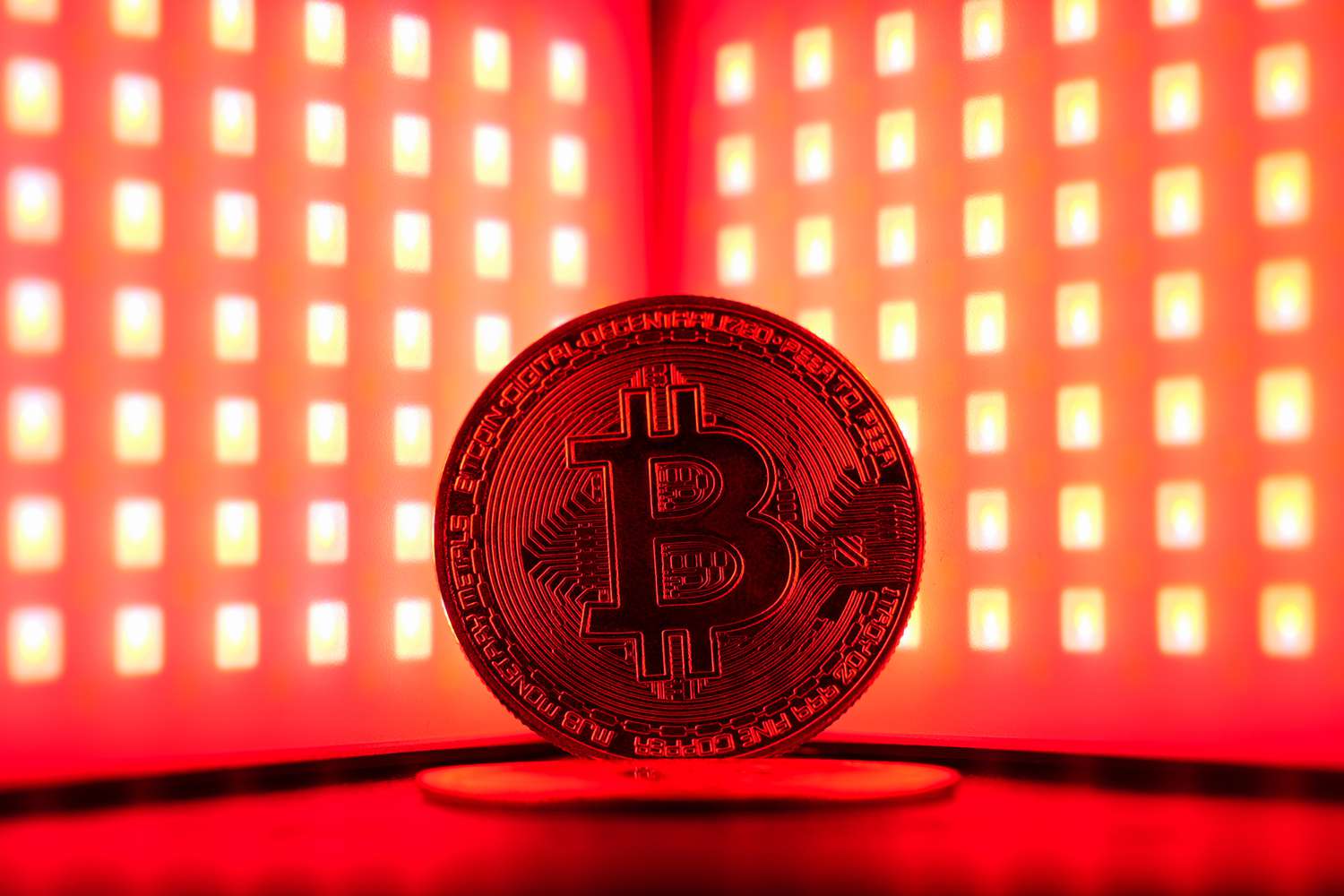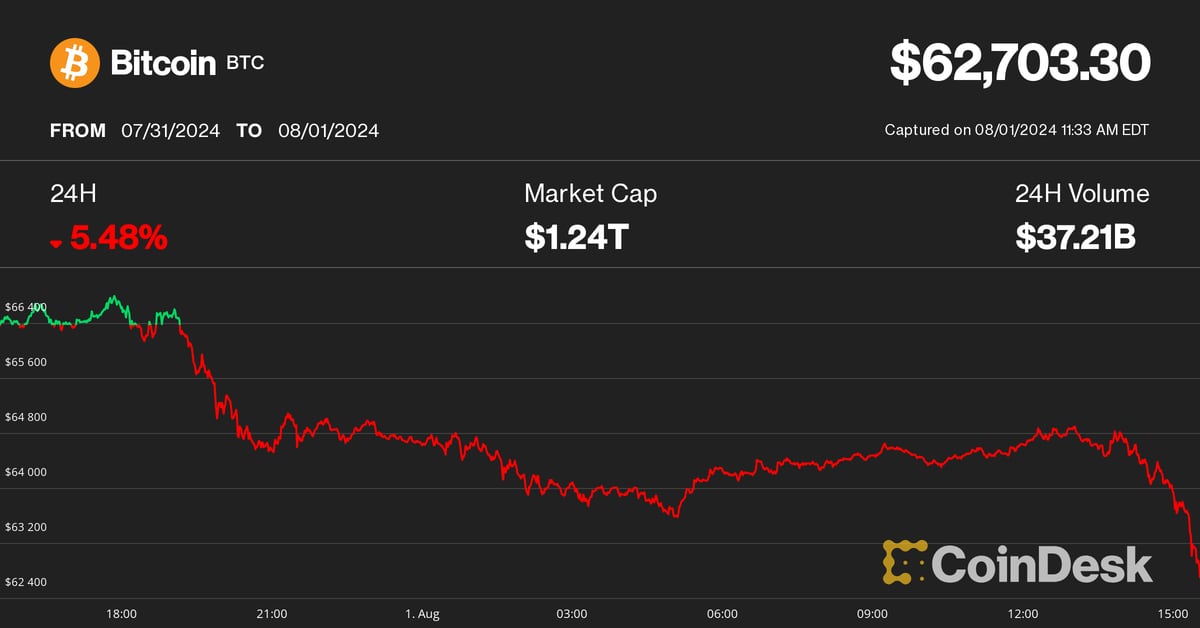Blockchain
Bitcoin briefly slips below $60,000, SEC drops Ethereum probe

Key points
- The price of bitcoin continued its month of suffering, as the price briefly dipped below $60,000 on Monday.
- Former bitcoin exchange Mt. Gox has announced that distribution of funds owed to former customers will begin in early July.
- The Securities and Exchange Commission (SEC) has closed its investigation into Ethereum without filing charges against blockchain technology company Consensys.
- Crypto asset manager Hashdex has filed for a combined bitcoin-ether spot ETF.
- This week, analysts will be watching to see if bitcoin can halt its decline, while also keeping an eye on Thursday’s US presidential debate.
June has not been kind to Bitcoin: The cryptocurrency’s price briefly slipped below the $60,000 level on Monday, after it looked like it might surpass the previous all-time high of more than $73,000 earlier in the month.
The most recent negative news for Bitcoin comes in the form of an arrival distribution of bitcoin due to former customers of the defunct bitcoin exchange Mount Goxwhich is estimated to involve the placing on the market of as many as 140,000 bitcoins.
That said, last week wasn’t all bad news for cryptocurrencies, as the U.S. Securities and Exchange Commission (SEC) concluded its investigation into Ethereum and blockchain technology company Consensys without filing any charges. Additionally, crypto asset manager Hashdex has filed for a spot cryptocurrency exchange-traded fund (ETF) which will focus on diversification.
Mt. Gox Refund Plan Causes Jitters in Bitcoin
Defunct bitcoin exchange Mt. Gox has announced that it will begin the long-awaited process of returning assets to its customers in July, more than a decade after filing for bankruptcy following numerous hacking incidents. The total amount of bitcoin to be distributed remains uncertain, with estimates ranging from 65,000 to 140,000 bitcoin, potentially valued at up to $9 billion.
While some investors worry that the influx of these bitcoins could depress prices, others argue that the potential selling pressure may be overstated, pointing out that creditors had years to sell their claims if they urgently needed funds. The announcement of Mt.Gox’s upcoming refunds caused the price of bitcoin to briefly dip below $60,000 on Monday, continuing its downward trend for the month.
According to data from Farside Investors, spot bitcoin ETFs suffered the largest outflows in a two-week period since spot bitcoin ETFs were approved in January, with investors taking out a net $1.1 billion from these funds in that period of time.
SEC closes investigation into Ethereum 2.0
On June 18th, blockchain Technology company Consensys announced that the SEC’s enforcement division has concluded its investigation into Ethereum 2.0. Despite the closure, the SEC’s position on the eventuality etherthe native token of the Ethereum blockchain, the title qualification remains ambiguous.
According to Consensys, the regulator began its investigation into Ethereum last year and the company sued the SEC earlier this year, arguing that Ether was a commodity and that the SEC had no jurisdiction to to investigate.
Although SEC Chairman Gary Gensler has not definitively labeled ether as a security, the Commodity Futures Trading Commission (CFTC) considers it a commodity. The closure of the investigation may indicate that the SEC tends to treat ether like a commodity, although the SEC’s future actions remain uncertain.
According to Fortune, Consensys’ legal battle with the SEC will continue despite the recent announcement. The conflict originally arose from the SEC’s control over the crypto wallet owned by Consensys MetaMask, particularly its token trading capabilities and access to staking. The SEC alleges that these functions constitute unlicensed brokerage activities involving unregistered cryptocurrency securities. Consensys indicated that while the closure of the Ethereum 2.0 investigation is a victory, it does not fully address the broader regulatory issues.
Hashdex file for the combined Bitcoin-Ether ETF
With bitcoin spot ETFs already trading in the US and Spot ether ETFs seem just around the corner, the next development could be a combined ETF with both major cryptocurrencies. Hashdex, a crypto asset manager, is leading this effort with a recent filing for the US Hashdex Nasdaq Crypto Index ETF.
If approved, this ETF would be the first in the United States to directly hold both bitcoin and ether. According to Nasdaq filings with the SEC, the ETF will track the market-cap-weighted Nasdaq Crypto Index (NCI). Coinbase Custody and BitGo will act as custodians. The ETF aims to provide a passive investment strategy, giving investors exposure to overall market performance. Hashdex already has a similar product in Brazil.
While the new ETF will initially focus on bitcoin and ether, the document leaves room for the inclusion of additional crypto assets in the future, provided they meet regulatory criteria. Bloomberg analyst James Seyffart noted that the SEC’s final decision on Hashdex’s filing is expected in early March 2025.
What to expect from the markets this week
Cryptocurrency market analysts will be watching the price of bitcoin closely this week, hoping for signs that the bleeding will stop, especially in the context of high bitcoin ETF outflows and upcoming Mt. Gox distributions.
However, some market observers, such as Custodia Bank founder and CEO Caitlin Long, say that the decline in bitcoin’s price is not something to worry about in the context of the recent halving event. “It is normal for a price drop like this to happen after a… halving“Halvings are incredibly bullish, but bull markets typically start several months later, for fundamental reasons,” Long wrote on X.
All eyes will now also be on Thursday’s US presidential debate between Joe Biden and Donald Trump, as conversations about cryptocurrencies find momentum in the wake of the election campaign.
Former President Trump has changed his stance on bitcoin, now seemingly supporting the cryptocurrency without making any definitive comments on regulatory or policy matters for digital assets. Due to the SEC’s aggressive enforcement actions during his administration, President Biden, by extension, has not been seen as a supporter of cryptocurrencies, an image his campaign is trying to disassociate from him, although there are no specifics on the cryptographic politics of that field, O.
Blockchain
Bitcoin (BTC) Price Crashes as Donald Trump’s Win Odds Dip

Markets received nominally good news on Thursday morning, with the US ISM manufacturing PMI for July falling much more than economists expected, sending interest rates to multi-month lows across the board. Additionally, initial jobless claims in the US jumped to their highest level in about a year. Taken together, the data adds to the sentiment that the US is on the verge of a cycle of monetary easing by the Federal Reserve, which is typically seen as bullish for risk assets, including bitcoin.
Blockchain
Terra Blockchain Reboots After Reentry Attack Leads to $4M Exploit

Please note that our Privacy Policy, terms of use, cookiesAND do not sell my personal information has been updated.
CoinDesk is a awarded press agency that deals with the cryptocurrency sector. Its journalists respect a rigorous set of editorial policiesIn November 2023, CoinDesk has been acquired from the Bullish group, owner of Bullisha regulated digital asset exchange. Bullish Group is majority owned by Block.one; both companies have interests in a variety of blockchain and digital asset businesses and significant digital asset holdings, including bitcoin. CoinDesk operates as an independent subsidiary with an editorial board to protect journalistic independence. CoinDesk employees, including journalists, are eligible to receive options in the Bullish group as part of their compensation.
Blockchain
$6.8M Stolen, ASTRO Collapses 60%

In the latest news in the blockchain industry, there has been a turn of events that has severely affected Terra and its users and investors, with the company losing $6.8 million. The attack, which exploited a reentry vulnerability in the network’s IBC hooks, raises questions about the security measures of the once celebrated blockchain protocol.
A web3 security company, Cyvers Alerts reported that the exploit occurred on July 31st and caused the company to lose 60 million ASTRO, 3.5 million USDC500,000 USDTand 2. 7 BitcoinThe flaw was discovered in April and allows cybercriminals to make payments non-stop by withdrawing money from the network.
Earth’s response
Subsequently, to the hack employed on the Terra blockchain, its official X platform declared the Suspension network operations for a few hours to apply the emergency measure. Finally in its sendTerra’s official account agreed, sharing that its operations are back online: the core transactions that make up the platform are now possible again.
However, the overall value of the various assets lost in the event was unclear.
Market Impact: ASTRO Crashes!
The hack had an immediate impact on the price of ASTRO, which dropped nearly 60% to $0.0206 following the network shutdown. This sharp decline highlights the vulnerability of token prices to security breaches and the resulting market volatility.
This incident is not the first time Terra has faced serious challenges. Earlier this year, the blockchain encountered significant problems that called into question its long-term viability. These repeated incidents underscore the need for stronger security measures to protect users’ assets and maintain trust in the network.
The recent Terra hack serves as a stark reminder of the ongoing security challenges in the blockchain space. As the platform works to regain stability, the broader crypto community will be watching closely.
Read also: Record Cryptocurrency Theft: Over $1 Billion Stolen in 2024
This is a major setback for Terra. How do you think this will impact the blockchain industry?
Blockchain
Luxembourg proposes updates to blockchain laws | Insights and resources

On July 24, 2024, the Ministry of Finance proposed Blockchain Bill IVwhich will provide greater flexibility and legal certainty for issuers using Distributed Ledger Technology (DLT). The bill will update three of Luxembourg’s financial laws, the Law of 6 April 2013 on dematerialised securitiesTHE Law of 5 April 1993 on the financial sector and the Law of 23 December 1998 establishing a financial sector supervisory commissionThis bill includes the additional option of a supervisory agent role and the inclusion of equity securities in dematerialized form.
DLT and Luxembourg
DLT is increasingly used in the financial and fund management sector in Luxembourg, offering numerous benefits and transforming various aspects of the industry.
Here are some examples:
- Digital Bonds: Luxembourg has seen multiple digital bond issuances via DLT. For example, the European Investment Bank has issued bonds that are registered, transferred and stored via DLT processes. These bonds are governed by Luxembourg law and registered on proprietary DLT platforms.
- Fund Administration: DLT can streamline fund administration processes, offering new opportunities and efficiencies for intermediaries, and can do the following:
- Automate capital calls and distributions using smart contracts,
- Simplify audits and ensure reporting accuracy through transparent and immutable transaction records.
- Warranty Management: Luxembourg-based DLT platforms allow clients to swap ownership of baskets of securities between different collateral pools at precise times.
- Tokenization: DLT is used to tokenize various assets, including real estate and luxury goods, by representing them in a tokenized and fractionalized format on the blockchain. This process can improve the liquidity and accessibility of traditionally illiquid assets.
- Tokenization of investment funds: DLT is being explored for the tokenization of investment funds, which can streamline the supply chain, reduce costs, and enable faster transactions. DLT can automate various elements of the supply chain, reducing the need for reconciliations between entities such as custodians, administrators, and investment managers.
- Issuance, settlement and payment platforms:Market participants are developing trusted networks using DLT technology to serve as a single source of shared truth among participants in financial instrument investment ecosystems.
- Legal framework: Luxembourg has adapted its legal framework to accommodate DLT, recognising the validity and enforceability of DLT-based financial instruments. This includes the following:
- Allow the use of DLT for the issuance of dematerialized securities,
- Recognize DLT for the circulation of securities,
- Enabling financial collateral arrangements on DLT financial instruments.
- Regulatory compliance: DLT can improve transparency in fund share ownership and regulatory compliance, providing fund managers with new opportunities for liquidity management and operational efficiency.
- Financial inclusion: By leveraging DLT, Luxembourg aims to promote greater financial inclusion and participation, potentially creating a more diverse and resilient financial system.
- Governance and ethics:The implementation of DLT can promote higher standards of governance and ethics, contributing to a more sustainable and responsible financial sector.
Luxembourg’s approach to DLT in finance and fund management is characterised by a principle of technology neutrality, recognising that innovative processes and technologies can contribute to improving financial services. This is exemplified by its commitment to creating a compatible legal and regulatory framework.
Short story
Luxembourg has already enacted three major blockchain-related laws, often referred to as Blockchain I, II and III.
Blockchain Law I (2019): This law, passed on March 1, 2019, was one of the first in the EU to recognize blockchain as equivalent to traditional transactions. It allowed the use of DLT for account registration, transfer, and materialization of securities.
Blockchain Law II (2021): Enacted on 22 January 2021, this law strengthened the Luxembourg legal framework on dematerialised securities. It recognised the possibility of using secure electronic registration mechanisms to issue such securities and expanded access for all credit institutions and investment firms.
Blockchain Act III (2023): Also known as Bill 8055, this is the most recent law in the blockchain field and was passed on March 14, 2023. This law has integrated the Luxembourg DLT framework in the following way:
- Update of the Act of 5 August 2005 on provisions relating to financial collateral to enable the use of electronic DLT as collateral on financial instruments registered in securities accounts,
- Implementation of EU Regulation 2022/858 on a pilot scheme for DLT-based market infrastructures (DLT Pilot Regulation),
- Redefining the notion of financial instruments in Law of 5 April 1993 on the financial sector and the Law of 30 May 2018 on financial instruments markets to align with the corresponding European regulations, including MiFID.
The Blockchain III Act strengthened the collateral rules for digital assets and aimed to increase legal certainty by allowing securities accounts on DLT to be pledged, while maintaining the efficient system of the 2005 Act on Financial Collateral Arrangements.
With the Blockchain IV bill, Luxembourg will build on the foundations laid by previous Blockchain laws and aims to consolidate Luxembourg’s position as a leading hub for financial innovation in Europe.
Blockchain Bill IV
The key provisions of the Blockchain IV bill include the following:
- Expanded scope: The bill expands the Luxembourg DLT legal framework to include equity securities in addition to debt securities. This expansion will allow the fund industry and transfer agents to use DLT to manage registers of shares and units, as well as to process fund shares.
- New role of the control agent: The bill introduces the role of a control agent as an alternative to the central account custodian for the issuance of dematerialised securities via DLT. This control agent can be an EU investment firm or a credit institution chosen by the issuer. This new role does not replace the current central account custodian, but, like all other roles, it must be notified to the Commission de Surveillance du Secteur Financier (CSSF), which is designated as the competent supervisory authority. The notification must be submitted two months after the control agent starts its activities.
- Responsibilities of the control agent: The control agent will manage the securities issuance account, verify the consistency between the securities issued and those registered on the DLT network, and supervise the chain of custody of the securities at the account holder and investor level.
- Simplified payment processesThe bill allows issuers to meet payment obligations under securities (such as interest, dividends or repayments) as soon as they have paid the relevant amounts to the paying agent, settlement agent or central account custodian.
- Simplified issuance and reconciliationThe bill simplifies the process of issuing, holding and reconciling dematerialized securities through DLT, eliminating the need for a central custodian to have a second level of custody and allowing securities to be credited directly to the accounts of investors or their delegates.
- Smart Contract Integration:The new processes can be executed using smart contracts with the assistance of the control agent, potentially increasing efficiency and reducing intermediation.
These changes are expected to bring several benefits to the Luxembourg financial sector, including:
- Fund Operations: Greater efficiency and reduced costs by leveraging DLT for the issuance and transfer of fund shares.
- Financial transactions: Greater transparency and security.
- Transparency of the regulatory environment: Increased attractiveness and competitiveness of the Luxembourg financial centre through greater legal clarity and flexibility for issuers and investors using DLT.
- Smart Contracts: Potential for automation of contractual terms, reduction of intermediaries and improvement of transaction traceability through smart contracts.
Blockchain Bill IV is part of Luxembourg’s ongoing strategy to develop a strong digital ecosystem as part of its economy and maintain its status as a leading hub for financial innovation. Luxembourg is positioning itself at the forefront of Europe’s growing digital financial landscape by constantly updating its regulatory framework.
Local regulations, such as Luxembourg law, complement European regulations by providing a more specific legal framework, adapted to local specificities. These local laws, together with European initiatives, aim to improve both the use and the security of projects involving new technologies. They help establish clear standards and promote consumer trust, while promoting innovation and ensuring better protection against potential risks associated with these emerging technologies. Check out our latest posts on these topics and, for more information on this law, blockchain technology and the tokenization mechanism, do not hesitate to contact us.
We are available to discuss any project related to digital finance, cryptocurrencies and disruptive technologies.
This informational piece, which may be considered advertising under the ethics rules of some jurisdictions, is provided with the understanding that it does not constitute the rendering of legal or other professional advice by Goodwin or its attorneys. Past results do not guarantee a similar outcome.
-

 Regulation11 months ago
Regulation11 months agoRipple CTO and Cardano founder clash over XRP’s regulatory challenges ⋆ ZyCrypto
-

 Regulation10 months ago
Regulation10 months agoNancy Pelosi Considers Supporting Republican Crypto Bill FIT21 – London Business News
-

 Videos11 months ago
Videos11 months agoCryptocurrency News: Bitcoin, ETH ETF, AI Crypto Rally, AKT, TON & MORE!!
-

 Regulation11 months ago
Regulation11 months agoBitcoin’s future is ‘bleak’ and ripe for regulation, says lead developer
-

 News8 months ago
News8 months agoAave Price Increases Following Whales Accumulation and V3.1 Launch
-

 Regulation8 months ago
Regulation8 months agoSouth Korea Imposes New ‘Monitoring’ Fees on Cryptocurrency Exchanges
-

 Regulation8 months ago
Regulation8 months agoA Blank Sheet for Cryptocurrencies: Kamala Harris’ Regulatory Opportunity
-

 Regulation8 months ago
Regulation8 months agoCryptocurrency Regulations in Slovenia 2024
-

 News11 months ago
News11 months agoThe trader earned $46 million with PEPE after reaching a new ATH
-

 Regulation10 months ago
Regulation10 months agoCrypto needs regulation to thrive: Tyler Cowen
-

 Blockchain11 months ago
Blockchain11 months agoSolana ranks the fastest blockchain in the world, surpassing Ethereum, Polygon ⋆ ZyCrypto
-

 Blockchain11 months ago
Blockchain11 months agoSolana Surpasses Ethereum and Polygon as the Fastest Blockchain ⋆ ZyCrypto





